Key takeaways:
- National identity is shaped by personal experiences, historical events, and cultural exchanges, demonstrating its dynamic and evolving nature.
- Globalization and social media play significant roles in broadening narratives, fostering inclusivity, and challenging traditional perceptions of identity.
- Challenges such as globalization, political narratives, and diverse interpretations impact individual and collective understandings of national identity.
- The future of national identity may hinge on technology’s ability to foster deeper connections amidst challenges like climate change and migration.
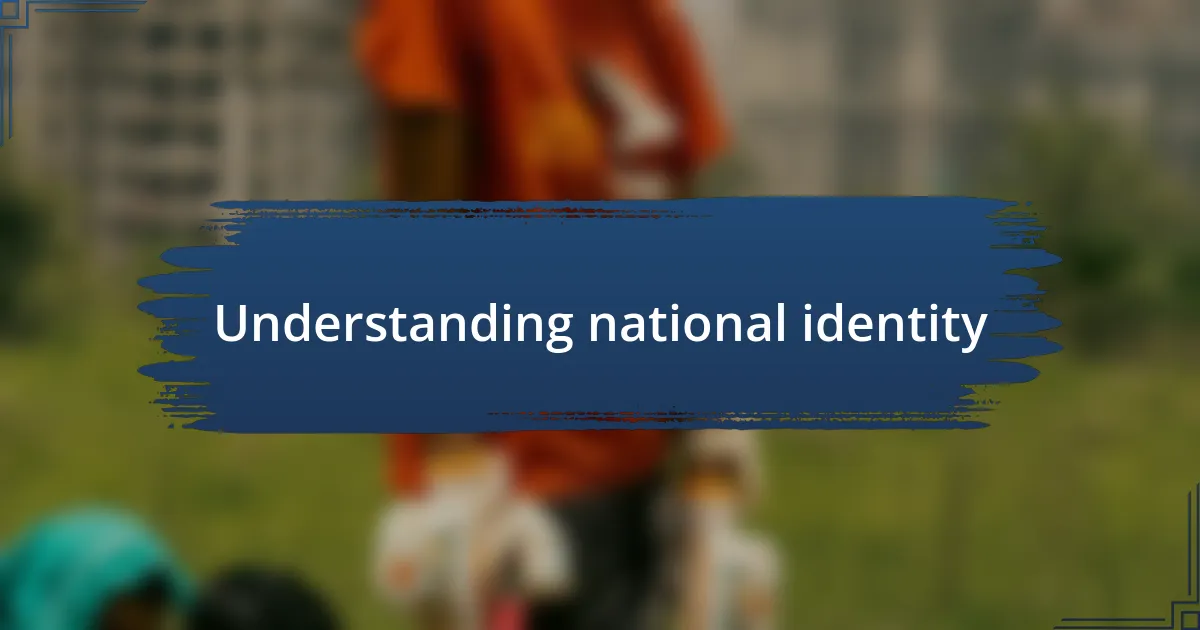
Understanding national identity concepts
National identity is a complex tapestry woven from culture, history, and shared values. I often reflect on my own experiences at family gatherings, where stories of past generations shape my understanding of who we are as a community. Have you ever felt a deeper connection to your roots when hearing familiar tales? It’s fascinating how these narratives bind us together.
When I think about what defines national identity, I can’t ignore the role of symbols, like flags or anthems. They evoke a sense of pride and unity, don’t they? The first time I stood for my national anthem, I felt a rush of emotion that was both personal and collective. It’s those moments that make us realize we are part of something larger than ourselves.
Additionally, national identity can shift over time, influenced by events and social changes. For instance, witnessing my country’s participation in global conflicts opened my eyes to the diverse perspectives within our own borders. Isn’t it interesting how these experiences challenge and reshape our understanding of ourselves as citizens? A dynamic national identity reflects our growth, struggles, and hope for the future.
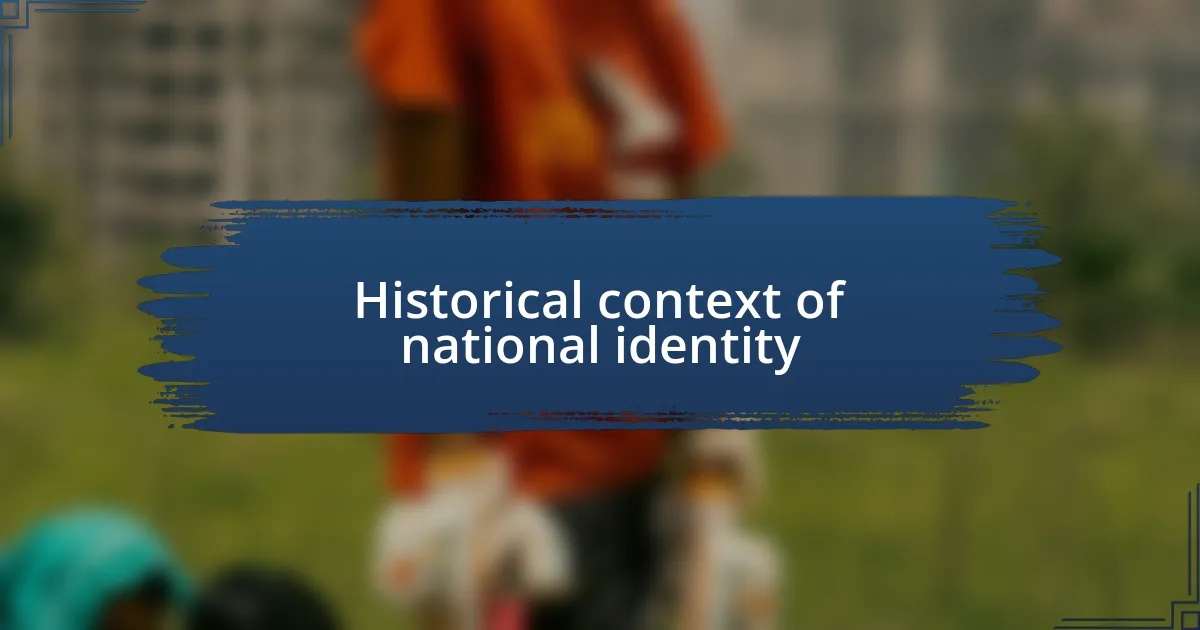
Historical context of national identity
As I dive into the historical context of national identity, I can’t help but think about how pivotal events shape collective memory. History is filled with moments that stir national sentiment—think about revolutions or independence movements. Reflecting on my experiences in history classes, I remember feeling a mix of pride and sorrow as we explored the struggles that led to the formation of modern nations. It’s intriguing how these stories influence how we perceive our identity today.
- The impact of colonialism often led to a redefinition of national boundaries and identities.
- Major wars can spark unity but also expose underlying divisions within a nation.
- Cultural movements, like the Renaissance or the Civil Rights Movement, play crucial roles in shaping contemporary national identities.
- Economic transformations, such as industrialization, have historically altered labor dynamics and influenced national pride.
- The struggle for independence stands as a testament to the resilience of people and the emergence of a new national consciousness.
Growing up, family stories of immigration filled me with curiosity about my roots. Listening to my grandparents narrate their journey made me appreciate the sacrifices they made for my current existence. I realized that these personal histories interweave with a broader national narrative, connecting past struggles with my present identity. This blend of personal and historical context truly deepens the conversation around what national identity means to me.
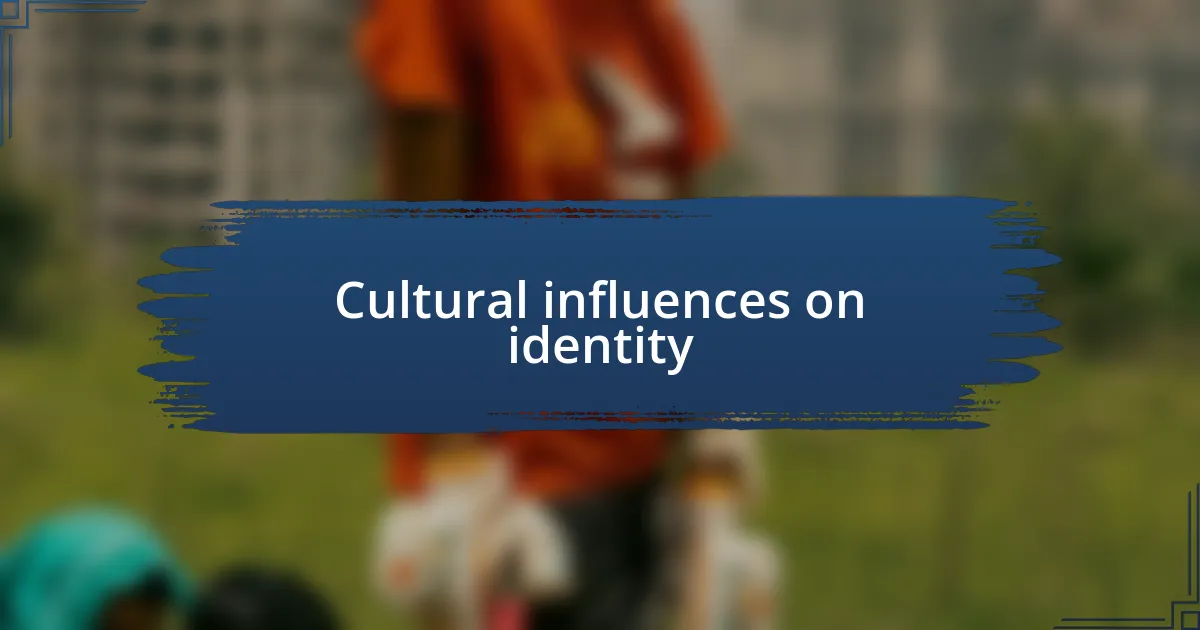
Factors shaping national identity today
The concept of national identity today is heavily influenced by globalization. As countries become more interconnected through trade, technology, and travel, it’s fascinating to see how cultural exchanges transform our understanding of what it means to belong. I often find myself reflecting on how new technologies allow voices from diverse backgrounds to participate in national conversations, creating a more inclusive narrative that wasn’t as accessible in the past.
Social media has further reshaped national identity by amplifying various cultural perspectives. I remember scrolling through posts from individuals across my nation who share their unique stories, struggles, and triumphs, which helps to build a sense of community. These platforms not only foster discussions about national identity but also challenge conventional ideas, allowing for a richer, multifaceted understanding of who we are as a nation today.
Moreover, the impact of immigration is undeniable in shaping national identities. Having friends from various backgrounds, I’ve seen firsthand the complexity that diversity brings to our collective identity. Their stories of adaptation and the blending of customs remind me that national identity isn’t static—it’s an ongoing evolution that reflects the dynamic nature of society.
| Factor | Impact on National Identity |
|---|---|
| Globalization | Brings cultural exchanges that broaden national narratives. |
| Social Media | Ampifies diverse voices, challenging traditional views on identity. |
| Immigration | Introduces new customs, fostering an evolving identity. |
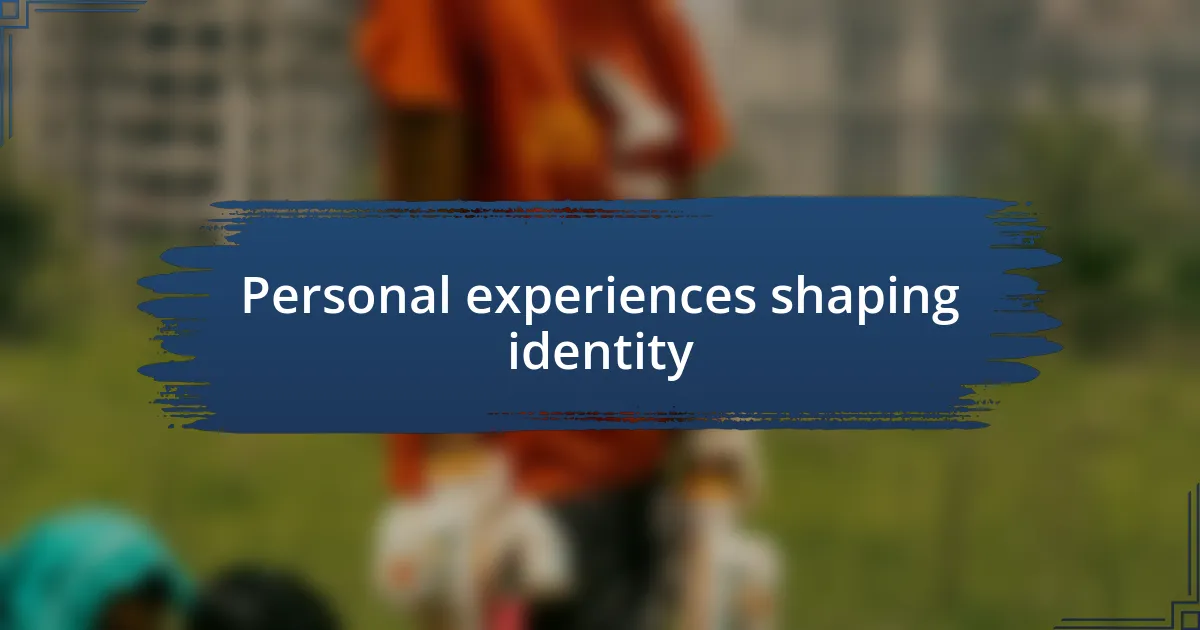
Personal experiences influencing my identity
Reflecting on my personal journey, I can pinpoint moments that profoundly shaped my sense of identity. Growing up in a multicultural neighborhood, I often felt the warmth of shared celebrations, such as Diwali and Eid, where neighbors came together to celebrate each other’s traditions. Those moments sparked a curiosity within me about the broader concept of belonging—what does it truly mean to be part of a community that embraces various cultures?
One experience that stands out was my visit to a local museum showcasing the history of immigration in my country. Walking through the exhibits, I felt a surge of pride in my own family’s story. If we can trace our roots back to different countries, how do we define our national identity? This question lingered with me, prompting me to appreciate the kaleidoscope of experiences that contribute to our shared narrative. The realization that our identities are woven together with the stories of countless others was a powerful lesson.
In my college years, I became active in a student organization focused on cultural dialogue. I remember organizing events where students shared their backgrounds—stories filled with resilience, hope, and challenges. Each sharing was illuminating, opening my eyes to perspectives that broadened my understanding of what it means to belong to a nation. Isn’t it incredible how our individual experiences can collectively shape a more inclusive identity? Experiencing these exchanges reinforced my belief that our personal stories are vital threads in the fabric of our national identity.
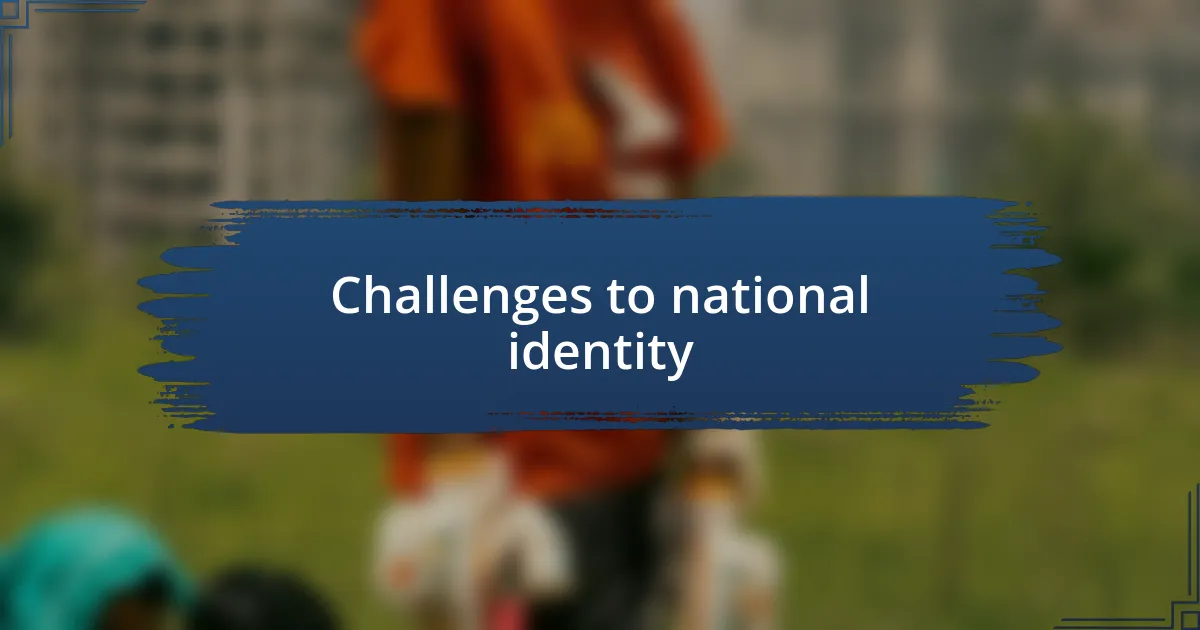
Challenges to national identity perception
Navigating the complexities of national identity, I often reflect on how external perceptions can challenge my understanding of self. For example, during a conversation with a friend from another country, I was surprised to discover that she viewed nationalism in a very different light. It made me question: how do we reconcile these diverse interpretations of what it means to belong to a nation?
One of the most pronounced challenges to national identity perception arises from the influence of globalization. As cultures intermingle, the traditional markers of identity—like language and customs—become diluted or even overshadowed. I recall feeling a sense of loss when I learned some of my cherished family traditions were becoming less relevant to younger generations. It left me pondering: is our national identity simply evolving, or is something vital slipping away?
Political narratives also complicate national identity, often leading to exclusion rather than unity. I watched a documentary that highlighted how certain groups are marginalized based on their ethnicity or beliefs, leading to a fractured sense of belonging among citizens. It struck me how narratives can shape our understanding of each other, prompting me to consider: what role do we play in fostering a more inclusive vision of national identity that honors every story?
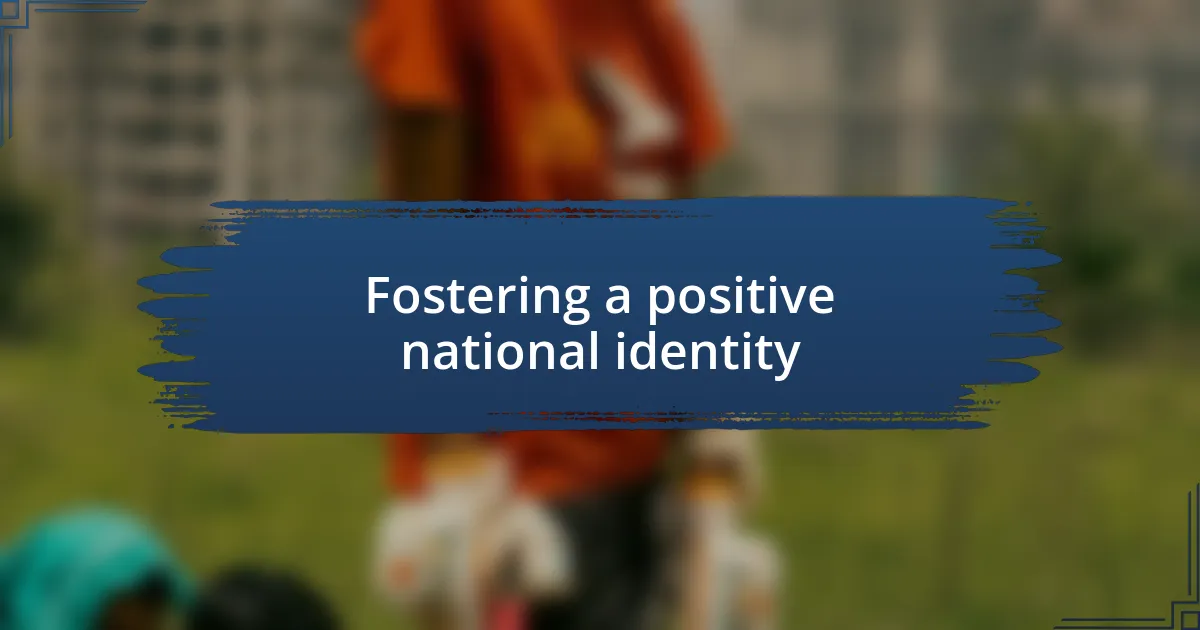
Future of national identity exploration
As I look ahead, I find myself contemplating how technology will influence the exploration of national identity. In a world increasingly connected by social media, I often see people sharing their cultural experiences online. It raises the question: will a digital connection dilute the essence of what it means to belong to a nation, or will it create a richer tapestry of shared identities that brings us closer together?
I remember a time when I participated in an online forum discussing diverse national identities. The exchange of ideas and experiences was enlightening and helped me discover perspectives I had never considered. How will this kind of global dialogue shape our understanding of national identity in the future? I believe such interactions can foster a greater appreciation for our differences and commonalities, yet I wonder if they can truly replace the depth of in-person connections.
In the face of climate change and migration, our national identities may be tested like never before. I often think about how communities will adapt as they welcome newcomers fleeing difficult circumstances. Will we redefine what it means to be a member of a nation, blending different backgrounds into a shared vision, or will fear and division widen the gap? The answers lie in our collective willingness to engage in open conversations and embrace the evolving nature of identity.
